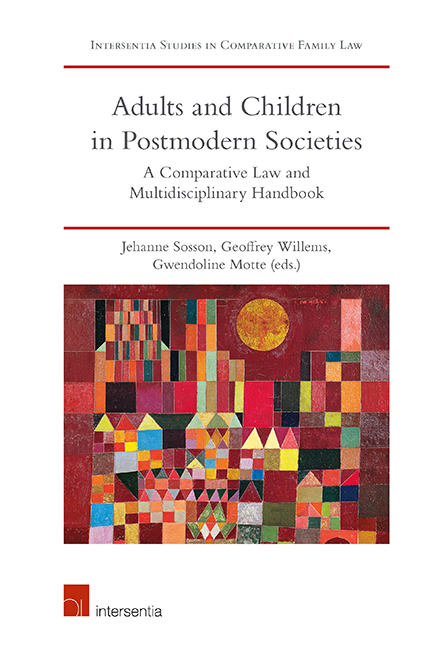Book contents
- Frontmatter
- Contents
- List of Cases
- List of Contributors
- Introduction
- PART I NATIONAL REPORTS ON LEGAL REGULATIONS OF RELATIONSHIPS BETWEEN ADULTS AND CHILDREN
- PART II INTERDISCIPLINARY APPROACH
- Historical Insights: The Historic Evolution of the Place of the Child in His or Her Family: From the Periphery, to the Centre, and Back?
- Philosophical Insights: The Weight of Truth in New Families
- Psychological Insights: Parent–Child Relationships in the Light of Psychology
- PART III INTERNATIONAL LAW INSIGHTS
- PART IV COMPARATIVE APPROACH
- General Conclusion: The Challenge of Transparent and Inclusive Parenthood/Parentality in a Pluralist and Cosmopolitan Context
- About the Editors
Psychological Insights: Parent–Child Relationships in the Light of Psychology
from PART II - INTERDISCIPLINARY APPROACH
Published online by Cambridge University Press: 26 June 2019
- Frontmatter
- Contents
- List of Cases
- List of Contributors
- Introduction
- PART I NATIONAL REPORTS ON LEGAL REGULATIONS OF RELATIONSHIPS BETWEEN ADULTS AND CHILDREN
- PART II INTERDISCIPLINARY APPROACH
- Historical Insights: The Historic Evolution of the Place of the Child in His or Her Family: From the Periphery, to the Centre, and Back?
- Philosophical Insights: The Weight of Truth in New Families
- Psychological Insights: Parent–Child Relationships in the Light of Psychology
- PART III INTERNATIONAL LAW INSIGHTS
- PART IV COMPARATIVE APPROACH
- General Conclusion: The Challenge of Transparent and Inclusive Parenthood/Parentality in a Pluralist and Cosmopolitan Context
- About the Editors
Summary
INTRODUCTION
Parent – child relationships are something natural that perpetuates the human species, not only for the purpose of reproduction but also because human babies are born into a state of great dependence. They are ‘altricial’ mammals, i.e. being born in a very immature and helpless condition. In the absence of care, human babies cannot survive. They therefore have to be related to adults who take care for them. As we will see in the current chapter, these relationships that seem to stem from biological evidence are nowadays complex, due to the diversification of family groups, the emergence of medically assisted procreation techniques and the influence of cultural backgrounds. Of course, we must recognise that alloparenting, i.e. any form of parental care provided by an individual towards a non-descendent young, has always existed in most societies. In the past centuries, children of upper-class families were raised and even breastfed by nurses. And collective arrangements were frequent in the kibbutz or in polygamous families. But the reason why parent – child relationships became a matter of concern at the end of the twentieth century is that children's social status has profoundly changed. During the greatest part of history, until the end of the twentieth century actually, the child had been regarded as a sort of miniature adult, an unfinished being, a subject to be re-educated. Childhood was considered a bad time to pass. Children were subjected to exploitation, neglect and maltreatment in many societies. The idea that children must be given special protection emerged in the twentieth century with the United Nations International Children's Emergency Fund (UNICEF), the Universal Declaration of Human Rights and finally, in 1989, the Convention on the Rights of the Child. And the notion of ‘best interests of the child’ appeared in this context. From that moment on, parent – child relationships were not only considered as a mean to ensure the survival of the human species, but as a setting to achieve child positive development.
Interestingly, psychology which is a young academic field compared to law, arose at the end of the nineteenth century. The study of the human mind and behaviour was firstly focused on adults. Scientific works concerning children emerged later.
- Type
- Chapter
- Information
- Adults and Children in Postmodern SocietiesA Comparative Law and Multidisciplinary Handbook, pp. 657 - 672Publisher: IntersentiaPrint publication year: 2019

